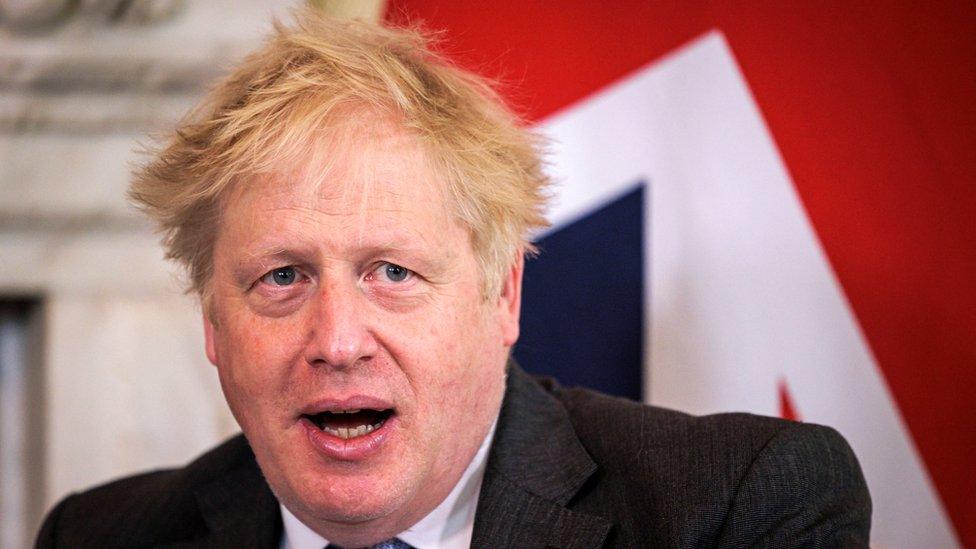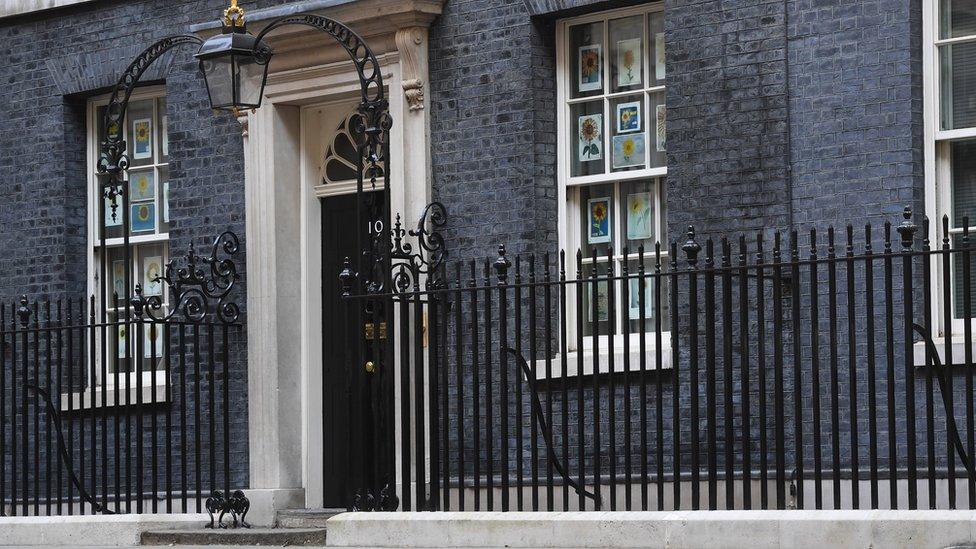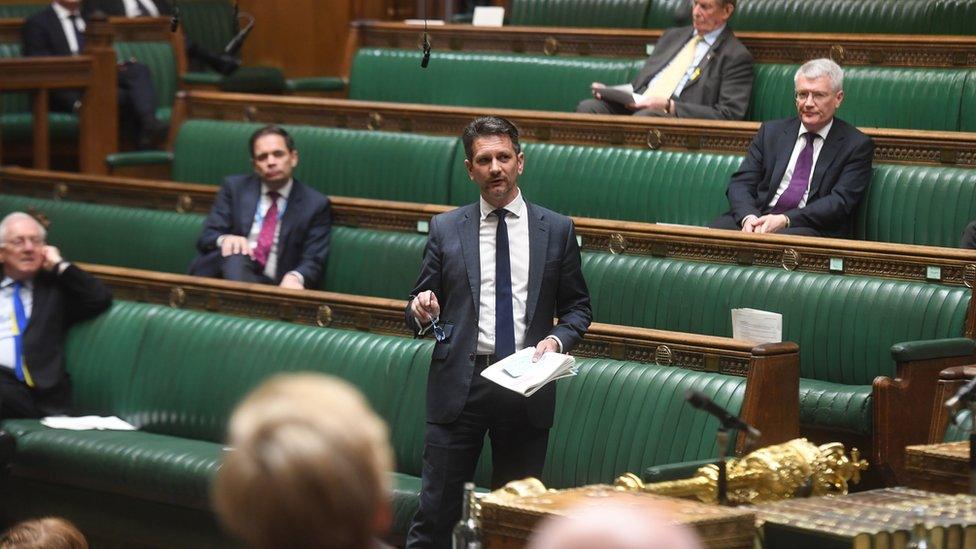Anxious wait for Sue Gray report continues in Westminster
- Published

When the full unexpurgated report from the senior civil servant Sue Gray is finally made public, there have been predictions that it could finish off Boris Johnson as prime minister.
His allies believe it will do no such thing.
But his position feels more precarious than at any time since the start of the Ukraine conflict.
Some Conservative MPs who've been critical of the PM have said they would await Ms Gray's findings before deciding to submit a letter of no confidence in him.
So there is little doubt that the report is anxiously awaited at Westminster.
It won't be released until the Metropolitan Police complete their investigations.
But the hope amongst her inquiry team is that it will be published by the end of May.
Frustrating Gray
There has been a frustration within Whitehall about an inability to be precise about the timescale.
So much is dependent on what has been described as the "unpredictability" of the Met.
The initial aspiration was that the full report could be released before Easter, but the Gray team were told that more questionnaires needed to be issued, meaning that hope was dashed.
So, any steer on when this process concludes still needs to be taken with more than a pinch of salt.
But the unpredictability of the Met may not be the only factor determining the final timing.

Sue Gray has been tasked with carrying out the inquiry into Downing Street parties during the pandemic
When MPs agreed to ask the Privileges Committee to examine whether the prime minister mislead Parliament, there was initially a suggestion by some in government this new inquiry might lead to a further delay in the release of the full Gray report.
But this week Downing Street said it was still the intention to publish the findings in full after the police conclude their work.
The one caveat was "data protection" considerations.
Ms Gray intends to name senior - but not junior - civil servants involved in the gatherings in government buildings.
I'm told there is currently a "live debate" on which names will be in the frame in the end.
And data protection could - potentially - stop the reproduction of WhatsApp messages that she has gathered, or the publication of photos of the events.
However, sources are suggesting she will not seek to publish all the evidence she has gathered and given to the police.
Ms Gray has been taking independent legal advice on what exactly she can make public and in what form.
She may selectively quote from WhatsApp messages or emails if these are deemed relevant to her narrative, but she is unlikely to reveal entire verbatim exchanges.
So, as presented, some of the evidence may not be as incendiary as some critics are anticipating - or hoping.
But what is she likely to say?
Gray areas
Those who are close to the inquiry team believe that most of her ire will be directed at the civil service, or parts of it.
She will not think highly of those who may have fallen short of the professional standards she would expect.
So the impression the report could give is that the prime minister was let down by some of the senior people advising him.
One senior government official told the BBC that there was "an element of truth" in this and that advisers had somehow convinced themselves that they weren't breaking any rules.
He argued that senior civil servants such as the prime minister's principal private secretary (PPS) and the head of propriety and ethics should have kept him on the straight and narrow.
Boris Johnson's PPS was Martin Reynolds - who sent the controversial 'bring your own booze' invite to the event in the Downing Street garden in May 2020.
And the head of propriety and ethics at the start of lockdown, who then was promoted to the position of deputy cabinet secretary in spring 2020, was Helen MacNamara.
She admitted to receiving a Fixed Penalty Notice for attending a colleague's leaving do in June 2020.
However, inside Whitehall there was also a feeling that Boris Johnson exhibited a distinct lack of curiosity in the rules himself.
And I'm told Sue Gray may find that perhaps too much of the burden of keeping him on the straight and narrow fell to too few people.

The Met are investigating 12 parties that took place in No 10 and across Whitehall
As previously reported, Ms Gray will stick to her remit.
She was told to look at the nature of the gatherings in government buildings, the attendance, and what Covid rules were in place at the time.
The report may inform decisions on whether civil servants should be disciplined.
But unlike when she was the head of propriety and ethics in Whitehall, preceding Ms MacNamara in that post, she is not now sitting in judgment of government ministers, including Mr Johnson.
She will confirm what events he attended, but may not answer questions many of his opponents want to know - such as whether he himself knew the nature of the gathering before going.
He has maintained he "believed implicitly" that the event in the Downing Street garden was a work event.
But even if Sue Gray were to describe it as no such thing, it isn't in her remit to challenge his "belief".
And on the night of an alleged party in his flat in November 2020, reports suggest the prime minister may maintain that his reason for being there was not to socialise, but to interview a political aide about a vacancy at No10.
Insiders have told us he did indeed regularly hold work meetings in his flat.
So it's not for Sue Gray to establish the veracity of the prime minister's account.
That is more likely to be the remit of the Privileges Committee inquiry.
All this does not mean, though, that her full report won't inflict any damage on the prime minister.
Neither dynamite nor damp squib?
Ms Gray's initial "update" in January was filleted of the detail of any gatherings which the police had decided to investigate.
But it included strong criticisms nonetheless - decrying "failures of leadership and judgment by different parts of No 10 and the Cabinet Office at different times".
Downing Street officials haven't seen the full report and I am told have made no attempt to dilute it.
So she may now give us the evidence for this conclusion.
Insiders believe that while it will be "damning for the civil service", they don't sense that Ms Gray has found, or would lob, "a stick of dynamite" that would blow up Mr Johnson's premiership.
But one former cabinet minister who has not yet submitted a no confidence letter expects the report to reveal "industrial" rule-breaking at the heart of government, and that it will be difficult for the PM to plead ignorance.
He assesses that this may be enough to convince even his pro-Johnson local party members to think again about the prime minister's future.
In her update, Ms Gray pronounced that some gatherings "should not have been allowed to develop as they did".
So it could be that gory details of the gatherings will now be provided, and be set unflatteringly in the context of the prevailing rules at the time.
She has already stated: "Too little thought (was) given to what was happening across the country in considering the appropriateness of some of these gatherings... and how they might appear to the public."
It's all but certain the official opposition will then have ready examples of families unable to see dying loved ones, or organise parties for young children, on the same days as the events in Downing Street.
And the simple act of officially setting out the prime minister's own attendance at some of these events may convince some of his internal critics that a leadership contest is preferable to a further inquiry by a Commons committee - at which Ms Gray may be asked to give evidence.
But, for others, that next inquiry might give them a reason to delay a decision on whether to back or try to sack Mr Johnson until the question of whether he told the truth to Parliament is settled.
Coalition of critics
The content of the full Gray report will be important, but so too will the prism through which it is being viewed.
And there seems to be more of Mr Johnson's MPs who are now willing to scour its pages and accentuate the negative - though his backers are still sceptical that the 54 no confidence letters that would lead to a vote on his leadership will be reached.
Before the Russian invasion, what was striking was not the scale of opposition - it wasn't huge - to Mr Johnson but the breadth.
Some previously loyal long-standing and low profile MPs said they had submitted letters of no confidence.
So too did some of the new, younger intake.
And Brexiteers and former Remainers alike were amongst the small band of openly critical Conservatives.
But attempts to co-ordinate a campaign of no confidence letter-writing failed.
Members of the "One Nation" group of Boris-sceptics were split on timing, and on alternative candidates.
And the leading lights in some of the other Conservative parliamentary groupings were non-committal.
That has now changed.

Tory MP Steve Baker told the Commons the PM should go
But now two former ministers - Steve Baker, who masterminded rebellions against Theresa May's Brexit deal, and the former chief whip Mark Harper - have added their voices to the calls for Boris Johnson to go.
Should they put their organisational prowess at the disposal of the prime minister's critics, the jeopardy to Boris Johnson will increase.
A series of unfortunate events?
The context of the report is also important.
If indeed it does emerge towards the end of May, it will come a few weeks after local elections in many parts of the UK.
Some of Mr Johnson's critics previously told me they wanted to judge what the electoral consequence of partygate was before deciding whether to move against the prime minister.
In truth, it may be difficult to disaggregate the reasons for any losses.
One of the key people in the Conservative campaign told me that partygate was as nothing "compared to the juggernaut of the cost of living which voters see coming towards them".
But were the Conservatives to lose flagship councils, such as Wandsworth in London, then - whatever the reason - that would deal a blow to the PM, and potentially weaken him before Ms Gray's report is published.
However, while Conservative insiders are predicting poor results in London, they are less downbeat about their prospects in some of the areas which the party took from Labour in 2019.
So if the elections go less badly than predicted, Mr Johnson's allies will lose no time in arguing that MPs should ditch him at their peril.
With the PM Johnson digging in, it may take a combination of bad election results, Ms Gray's report and possibly criticism from the cross party privileges committee for his detractors to risk mounting an assault.
In a week when a government minister described moves to get more civil servants into the office as "Dickensian", Mr Johnson may well remind readers of one of the great writer's characters, Mr Micawber, ever hopeful in adversity that something would turn up.
In the end, it did for Micawber.
So although Mr Johnson's opponents see him as potentially vulnerable again, expect more twists in this tale.